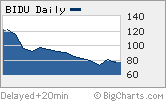 |
| Broken China: Shares of search engine Baidu have fallen sharply since the blockbuster IPO. |
|
|
|
|
|
|
|
|
|
|
|
NEW YORK (CNN/Money) � It's official. The honeymoon is over for Baidu.
Baidu, the China-based search-engine company frequently referred to as China's Google, went public nearly three weeks ago and the stock soared 354 percent in its first day of trading.
But since then, it's been all downhill. Shares have plunged 37 percent from the first-day close and are nearly 50 percent below the all-time high of $153.94 a share they hit on day 2.
Even though the company reported late Tuesday afternoon that second-quarter sales more than doubled and that profits increased more than six-fold, shares tumbled more than 5 percent Wednesday morning on the news.
History is not on Baidu's side
Still, investors that might be tempted by Baidu's (Research) growth prospects in China should be wary.
Many professional investors that were fortunate enough to get a piece of Baidu's IPO treated the stock as a short-term gift to trade for quick profits.
"I ended up selling because it went so ballistic that I didn't see how I could possibly hold onto it when it was a three-digit number," said Michael Mahoney, managing director of EGM Capital, a San Francisco-based hedge fund that did receive an allocation of Baidu shares at their offering price of $27.
Even with the slide, the stock is no bargain. The company generated about $13 million in sales in 2004 but has a market value of $2.6 billion. That's a trailing price-to-sales ratio of nearly 200. (No analysts cover Baidu just yet so there are no earnings or sales estimates for the company.)
It seems odd that Baidu should trade at such a lofty valuation when there are many other Chinese Internet stocks that investors can buy that also offer explosive growth potential and trade at reasonable multiples.
"Netease and Ctrip are generating impressive revenue and earnings growth and it's not reflected in their stock prices," said Zachary Karabell, co-manager of the China-U.S Growth fund run by Fred Alger Management.
Netease (Research), an online media and gaming company, trades at about 24 times 2005 earnings estimates and profits are expected to increase at a 34 percent clip annually for the next few years.
Ctrip (Research), an online travel firm, trades at 37 times analysts' 2005 profit projections and earnings are expected to grow at rate of 35 percent a year for the next few years. Karabell's firm owns both stocks in the fund. It also received an allocation of Baidu but Karabell would not comment on whether or not it still owns the stock.
What's more, just because Baidu shares are well off their highs doesn't mean they can't go lower still. The tech landscape is littered with companies that soared on day 1 and subsequently crashed below their offering price.
What's to prevent Baidu from meeting the same fate? Afterall, though Baidu is rapidly growing, it will face plenty of competition in China from other well-established Chinese Internet companies like Netease, Sohu (Research) and Sina (Research).
Then there are the two U.S. search giants.
Even though Google (Research) owns a 2.6 percent stake in Baidu, it's expanding in China and has to be considered more of a competitor than a strategic partner.
And Yahoo! (Research) recently made a big investment in China, acquiring a 40 percent stake in leading e-commerce firm Alibaba.com.
Keep searching for a lower price
And now that Baidu is a public company with a lot of buzz -- and fickle momentum investors -- it is going to be subject to the wild ways of the Wall Street quarterly earnings expectations game.
"There is a lot of excitement with Baidu and investors have to be careful of that," said Karabell.
When the company announced its second-quarter results, it also gave guidance for the third quarter and said that sales should be up between 139 percent and 151 percent from a year ago. That's phenomenal growth.
But investors appeared to be disappointed by the fact that sales would be up only in a range of 11 percent to 16.5 percent sequentially. By way of comparison, Baidu's second-quarter sales were up nearly 53 percent from the first quarter.
This isn't to suggest that Baidu is going to go out of business anytime soon. After all, several of the IPO flameouts from the tech boom are still around and are doing reasonably well.
Akamai Technologies (Research) , Foundry Networks (Research) and webMethods (Research), for example, are all profitable companies that are exhibiting strong growth. They just couldn't live up to the insane hype and justify the rich valuations that giddy investors had for them on their first day of trading.
Baidu looks like it's in the same boat. The company is on a fantastic growth trajectory but it just might not be worth $80 a share.
"I was impressed with the CEO and the company's plans," said Mahoney. "There's a price at which I would be very interested in buying Baidu back. I'm not sure exactly where it is but it is probably still south of where it is trading right now."
For a look at more Internet stocks, click here.
For more international business news, click here.
Sign up to receive the Tech Investor column by e-mail.
Plus, see more tech commentary and get the latest tech news.

|